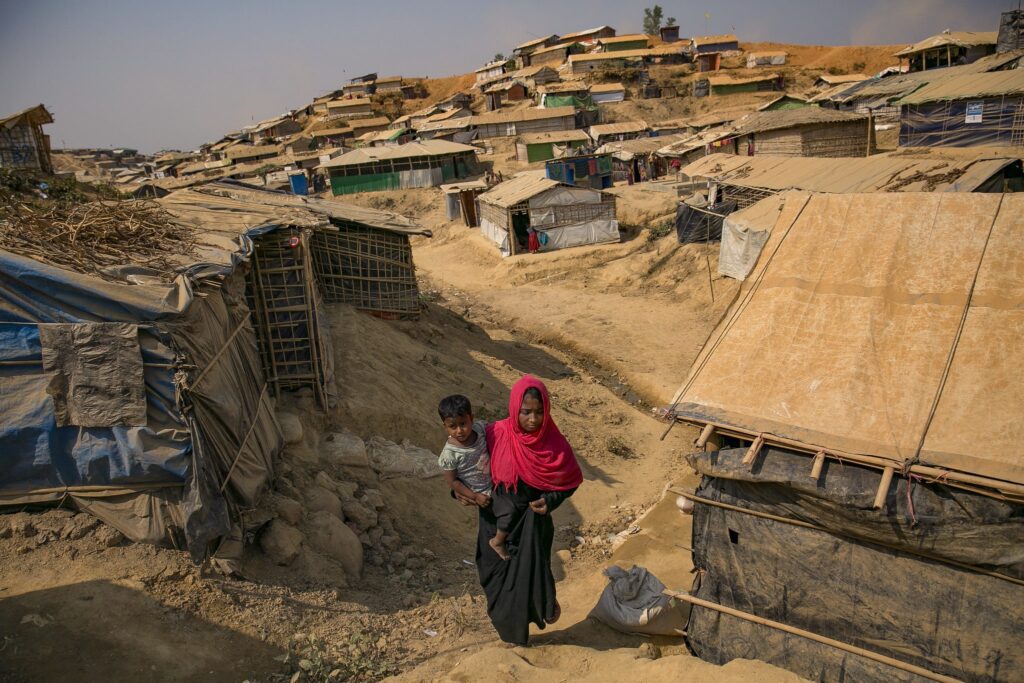LONDON, United Kingdom — Bangladesh, already facing significant poverty challenges, is grappling with the added strain of hosting more than a million Rohingya refugees. The country’s resources are stretched thin and the declining international aid is only exacerbating the situation. As global crises like the COVID-19 pandemic, the Palestine conflict and the war in Ukraine take center stage, the Rohingya refugee crisis in Bangladesh is slipping from international attention, leaving the most vulnerable at greater risk.
Strained Resources and Declining Aid for Rohingya Refugees
Bangladesh’s economic situation has deteriorated significantly in recent times, with the pandemic and Russia’s war in Ukraine exacerbating existing challenges. Inflation has surged, with food prices reaching a 12-year high, severely impacting the cost of living for the average citizen. The Bangladeshi taka has also depreciated by approximately 30% against the U.S. dollar in the past two years, further straining the economy.
As a result, Bangladesh, the third-largest food-importing country globally, faces severe repercussions as the falling taka and reduced spending power threaten the livelihoods of its people. The influx of Rohingya refugees, who fled violence in Myanmar, has added immense pressure on an already struggling nation. With inflation, unemployment and income inequality rising to critical levels, the demand for resources has intensified in both refugee and local communities. The Rohingya, almost entirely dependent on international aid, have seen their lifeline diminish as global attention and funding shift elsewhere.
The situation worsened when the United Nations World Food Programme (WFP) announced cuts to food rations for the Rohingya due to funding shortages. This reduction in aid is not only affecting the refugees but also exacerbating the poverty and food insecurity that local Bangladeshi communities face. With net foreign currency reserves dwindling to $20.4 million and the government’s borrowing contributing to inflation, the economic burden on Bangladesh continues to grow, leaving the most vulnerable populations in an increasingly precarious situation.
Survival Amid Food Ration Cuts for Rohingya Refugees
Surviving has become increasingly difficult for Rohingya refugees in Bangladesh as food ration cuts exacerbate their already dire conditions. With limited resources and an almost complete dependency on international aid, the reduction in food assistance has led to severe hardships. WFP was forced to slash food rations due to significant funding shortfalls, leaving refugees with just $8 per person per month, barely enough to meet basic nutritional needs.
These cuts have placed immense strain on the Rohingya, who are already grappling with overcrowded camps, inadequate access to clean water and a lack of medical services. The Rohingya face an increasingly bleak reality, with many struggling to secure even one meal a day.
Novo Jibon: On the Front Lines
Novo Jibon – New Life Charity Trust, a grassroots organization working since 1998, is at the forefront of efforts to support Rohingya refugees and impoverished Bangladeshi communities. The Borgen Project spoke with Mr. Hasan Abdullah, Head of Marketing, Fundraising and Communications at Novo Jibon, about the challenges his organization faces. “The reduction in international aid has been devastating,” Abdullah shared. “We’ve had to make tough choices about which programs to cut or scale back, knowing that each decision directly affects the lives of vulnerable people.” Novo Jibon has been forced to prioritize essential services like food distribution while cutting back on medical care and educational programs.
In response to declining aid, Novo Jibon has focused on building local partnerships and creating sustainable, community-driven projects. These initiatives aim to empower refugees and local residents by providing them with skills and opportunities to generate their own income. For example, Novo Jibon has launched small-scale income-generating projects within the refugee camps, such as sewing cooperatives and agricultural plots. These initiatives help refugees become more self-reliant while reducing their dependence on dwindling international aid. However, the challenges are immense. Abdullah noted that political and logistical constraints often hinder the expansion of these sustainable solutions, limiting their potential impact.
Impact on Rural Bangladesh
Novo Jibon’s work extends beyond the refugee camps to the rural areas of Bangladesh, where poverty is also deeply entrenched. The organization’s projects in these regions are closely linked to the aid provided to the Rohingya refugees. Both communities face similar challenges, including limited access to clean water, education and health care.
By addressing these issues holistically, Novo Jibon can maximize its resources and create solutions that benefit both the rural Bangladeshi population and the Rohingya refugees. For instance, water and sanitation projects in rural areas have been expanded to include the Rohingya camps, ensuring that both communities have access to essential services.
The Need for Continued Support
As the global focus shifts to other crises, fundraising for Bangladesh and the Rohingya refugees has become increasingly difficult. Abdullah explained that the COVID-19 pandemic, the war in Ukraine and the ongoing conflict in Palestine have all diverted attention and resources away from the Rohingya crisis. Despite these challenges, Novo Jibon remains committed to its mission. “We are working on building sustainable, community-driven projects that can continue even if international support dwindles further,” Abdullah said.
– Sumaiya Sultana
Sumaiya Sultana is based in London, UK and focuses on Technology and Politics for The Borgen Project.
Photo: Flickr

